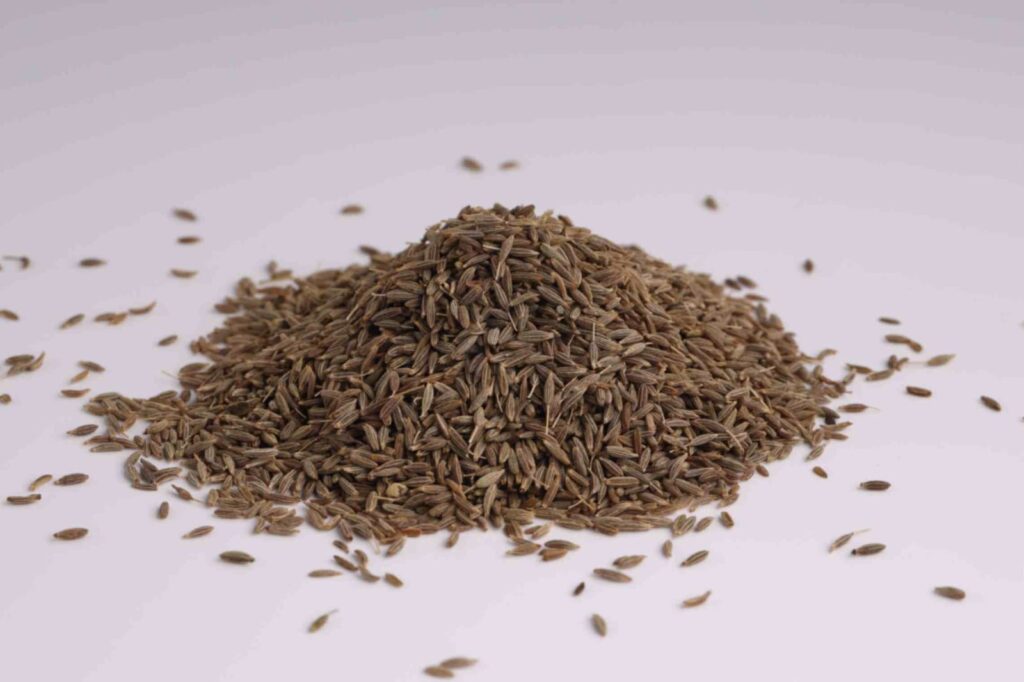Cumin seeds, often simply referred to as cumin, are small elongated seeds harvested from the fruit of the cumin plant (Cuminum cyminum). Cumin is a popular spice known for its distinctive warm and earthy flavor with a hint of citrus. It’s widely used in culinary traditions around the world, particularly in Indian, Middle Eastern, Mexican, and North African cuisines.
Key Characteristics of Cumin Seeds:
- Flavor: Cumin seeds have a robust, aromatic flavor with a combination of earthy, nutty, and slightly spicy notes. They also have a subtle citrus undertone.
- Appearance: Cumin seeds are small and elongated, resembling caraway seeds but with a different flavor profile. They are typically brown in color.
Culinary Uses of Cumin Seeds:
Cumin is a versatile spice that adds depth and richness to various dishes. Here are some common culinary uses of cumin seeds:
- Spice Blends: Cumin is a key ingredient in many spice blends, such as curry powder, garam masala, and chili powder. It imparts its unique flavor to these mixtures.
- Curries: Cumin is a staple in Indian and South Asian cuisine, where it’s used in curries, dals (lentil dishes), and vegetable preparations.
- Soups and Stews: Cumin seeds can be added to soups, stews, and chili to enhance their flavor and aroma.
- Rice Dishes: In many cultures, cumin is used to flavor rice dishes, such as biryani and pilaf.
- Roasted and Grilled Meats: Cumin complements the flavors of roasted and grilled meats, particularly when used in rubs and marinades.
- Breads: Cumin seeds can be added to bread dough to create flavorful bread, rolls, or flatbreads.
- Pickles: Cumin seeds are sometimes used in pickling spices for vegetables.
What is the nutritional value of cumin seeds?
- Calories: 22
- Carbohydrates: 2.7 grams
- Dietary Fiber: 0.6 grams
- Protein: 1 gram
- Total Fat: 1.3 grams
- Saturated Fat: 0.1 grams
- Monounsaturated Fat: 0.6 grams
- Polyunsaturated Fat: 0.2 grams
- Omega-3 Fatty Acids: 9.2 milligrams
- Omega-6 Fatty Acids: 171 milligrams
- Vitamins and Minerals:
- Vitamin C: 0.5 milligrams (1% of the Daily Value)
- Vitamin K: 5.4 micrograms (7% of the Daily Value)
- Calcium: 37 milligrams (4% of the Daily Value)
- Iron: 1.4 milligrams (16% of the Daily Value)
- Magnesium: 22 milligrams (6% of the Daily Value)
- Phosphorus: 27 milligrams (4% of the Daily Value)
- Potassium: 93 milligrams (2% of the Daily Value)
- Zinc: 0.4 milligrams (4% of the Daily Value)
Cumin seeds are a good source of iron, providing a significant portion of the daily recommended intake. Iron is essential for the formation of red blood cells and the transport of oxygen throughout the body. Additionally, cumin seeds contain small amounts of other vitamins and minerals, including calcium, magnesium, and vitamin K.
Health Benefits of Cumin Seeds:
Cumin seeds are not only prized for their culinary value but also for their potential health benefits. Some of these benefits include:
- Digestive Aid: Cumin seeds are known to aid digestion, relieve bloating, and reduce gas. They stimulate the production of digestive enzymes.
- Antioxidant Properties: Cumin seeds contain antioxidants, which can help combat oxidative stress and inflammation.
- Blood Sugar Control: Some studies suggest that cumin may help lower blood sugar levels and improve insulin sensitivity.
- Iron Absorption: Cumin contains compounds that can enhance the absorption of iron from plant-based foods.
- Anti-Inflammatory: Cumin has anti-inflammatory properties and may help reduce inflammation in the body.
- Weight Management: The fiber in cumin seeds may promote feelings of fullness, aiding in weight management.
- Antimicrobial: Cumin seeds have antimicrobial properties that may help combat certain bacteria and fungi.
How to use cumin seeds for weight loss?
- Cumin Water (Jeera Water):
- This is a simple and popular way to use cumin seeds for weight loss.
- Boil a teaspoon of cumin seeds in a cup of water.
- Allow it to steep for 5-10 minutes, then strain.
- Drink this cumin-infused water on an empty stomach in the morning or before meals. Some people prefer to add a bit of honey or lemon for taste.
- Cumin Tea:
- Similar to cumin water, you can make cumin tea by steeping cumin seeds in hot water.
- Add crushed or whole cumin seeds to a cup of boiling water.
- Let it steep for a few minutes, strain, and drink.
- Sprinkle on Meals:
- Sprinkle ground cumin seeds on your meals, including salads, soups, and roasted vegetables, to enhance flavor and potentially promote feelings of fullness.
- Cumin and Yogurt:
- Mix ground cumin seeds with yogurt for a flavorful and satisfying snack.
- Yogurt provides protein and probiotics, which can also support weight management.
- Cumin in Cooking:
- Use cumin seeds as a spice in various dishes, such as curries, lentil soups, and rice dishes.
- Incorporating cumin seeds into your cooking can make your meals more flavorful and potentially aid in digestion.
- Cumin Capsules or Supplements:
- Some individuals choose to take cumin supplements in the form of capsules or extracts.
- If you opt for supplements, consult with a healthcare provider or registered dietitian to ensure they are safe and appropriate for your needs.
It’s important to note that while cumin seeds may offer potential benefits for weight management, they are not a magic solution for losing weight. Successful weight management typically involves a combination of factors, including a balanced and calorie-controlled diet, regular physical activity, portion control, and healthy lifestyle choices.
Before making significant dietary changes or using cumin seeds or supplements for weight loss, it’s advisable to consult with a healthcare provider or registered dietitian. They can provide personalized guidance based on your individual health status and goals, ensuring that your approach to weight management is safe and effective.
Can cumin seeds help with digestion?

Yes, cumin seeds are known for their potential digestive benefits and have been used in traditional medicine and culinary traditions for centuries to aid digestion. Here’s how cumin seeds can help with digestion:
- Stimulating Digestive Enzymes: Cumin seeds contain compounds that can stimulate the pancreas to release digestive enzymes, including amylases, lipases, and proteases. These enzymes are essential for breaking down carbohydrates, fats, and proteins in the food you eat, making them easier to digest.
- Reducing Bloating and Gas: Cumin seeds can help reduce bloating, gas, and discomfort associated with indigestion. They have carminative properties, which means they can alleviate gas by relaxing the gastrointestinal muscles and promoting the expulsion of trapped gas.
- Relieving Upset Stomach: Cumin seeds are often used to soothe an upset stomach. Chewing on a few cumin seeds or drinking cumin tea can provide relief from nausea, stomach cramps, and digestive discomfort.
- Anti-Inflammatory Effects: Cumin seeds contain anti-inflammatory compounds that can help reduce inflammation in the digestive tract. This may be particularly beneficial for individuals with conditions like irritable bowel syndrome (IBS) or inflammatory bowel disease (IBD).
- Improving Nutrient Absorption: Cumin seeds can enhance the absorption of nutrients, including iron and calcium, from the food you consume. This can contribute to overall better nutrient utilization in the body.
To use cumin seeds for digestion:
- Chew a few cumin seeds after meals to stimulate the release of digestive enzymes and reduce post-meal discomfort.
- Drink cumin tea by steeping crushed or whole cumin seeds in hot water. This can be particularly soothing for digestive troubles.
- Incorporate ground cumin seeds into your cooking. It can add flavor to dishes while potentially aiding digestion.
While cumin seeds are generally safe for most people, it’s important to consume them in moderation, as excessive intake may lead to digestive discomfort. If you have specific digestive issues or concerns, it’s advisable to consult with a healthcare provider or registered dietitian for personalized guidance on using cumin seeds or other dietary strategies to support your digestive health.
Are there any side effects of consuming cumin seeds?
Cumin seeds are generally safe for most people when consumed in moderate amounts as a spice or flavoring agent in foods. They are a common ingredient in many culinary traditions and have been used for centuries without significant reported side effects. However, like many foods and spices, cumin seeds may cause adverse reactions in some individuals. Here are potential considerations and side effects associated with cumin seeds:
- Allergies: Some people may be allergic to cumin or cumin seeds, which can result in symptoms such as skin rashes, itching, swelling, or respiratory issues. If you suspect an allergy to cumin, avoid its consumption and seek medical advice.
- Gastrointestinal Discomfort: While cumin seeds are known to aid digestion for many people, excessive consumption or sensitivity to cumin’s compounds may lead to gastrointestinal discomfort. This can include symptoms like gas, bloating, or upset stomach.
- Skin Reactions: In rare cases, topical contact with cumin oil or extracts may cause skin irritation, redness, or rashes. It’s important to conduct a patch test before applying cumin oil to the skin to ensure you don’t have a sensitivity.
- Hypoglycemia: Cumin seeds may have a blood sugar-lowering effect. If you have diabetes or are taking medications to manage blood sugar levels, monitor your blood sugar closely when using cumin seeds or supplements to avoid hypoglycemia (low blood sugar).
- Pregnancy and Breastfeeding: Pregnant and breastfeeding women should use cumin seeds in moderation as part of their diet. Excessive consumption of cumin seeds or supplements during pregnancy may not be advisable.
- Medication Interactions: While cumin seeds are generally safe, they may interact with certain medications, especially those related to blood clotting or blood sugar control. If you’re taking medications, consult with your healthcare provider before significantly increasing your cumin seed intake or using cumin supplements.
It’s essential to consume cumin seeds in moderation and be mindful of your individual tolerance and sensitivities. If you have specific health concerns or conditions, consult with a healthcare provider or registered dietitian for personalized guidance on incorporating cumin seeds into your diet safely. Additionally, if you experience any unusual or severe side effects after consuming cumin seeds, seek medical attention promptly.
Can cumin seeds help lower blood sugar levels?
- Improved Insulin Sensitivity: Cumin seeds contain compounds that may enhance insulin sensitivity, which means that the body’s cells become more responsive to insulin’s action. Improved insulin sensitivity can help glucose enter cells more efficiently, reducing blood sugar levels.
- Reduced Glycemic Response: Some studies have shown that adding cumin seeds to meals can lead to a lower glycemic response, meaning that the rise in blood sugar after eating is less pronounced. This effect may be attributed to the fiber and compounds in cumin seeds.
- Potential Antioxidant Effects: Cumin seeds contain antioxidants, which can help reduce oxidative stress and inflammation, both of which are associated with impaired blood sugar control.
- Enhanced Digestion: Cumin seeds have traditionally been used to aid digestion, and better digestion can contribute to more stable blood sugar levels by preventing rapid spikes and crashes.
- Appetite Control: Cumin seeds may promote feelings of fullness and reduce appetite, which can help with weight management and blood sugar regulation.
While these potential benefits are promising, it’s important to note that more research is needed to fully understand the extent of cumin seeds’ impact on blood sugar levels. Additionally, individual responses to cumin seeds can vary, and their effects may not be significant enough to replace standard treatments for diabetes or blood sugar control.
Are cumin seeds good for skin health?
- Improved Insulin Sensitivity: Cumin seeds contain compounds that may enhance insulin sensitivity, which means that the body’s cells become more responsive to insulin’s action. Improved insulin sensitivity can help glucose enter cells more efficiently, reducing blood sugar levels.
- Reduced Glycemic Response: Some studies have shown that adding cumin seeds to meals can lead to a lower glycemic response, meaning that the rise in blood sugar after eating is less pronounced. This effect may be attributed to the fiber and compounds in cumin seeds.
- Potential Antioxidant Effects: Cumin seeds contain antioxidants, which can help reduce oxidative stress and inflammation, both of which are associated with impaired blood sugar control.
- Enhanced Digestion: Cumin seeds have traditionally been used to aid digestion, and better digestion can contribute to more stable blood sugar levels by preventing rapid spikes and crashes.
- Appetite Control: Cumin seeds may promote feelings of fullness and reduce appetite, which can help with weight management and blood sugar regulation.
How to make cumin seed tea?
Cumin seed tea is a flavorful and aromatic beverage that is easy to prepare and is known for its potential digestive benefits. Here’s a simple recipe for making cumin seed tea:
Ingredients:
- 1 teaspoon whole cumin seeds
- 1 cup of water
- Optional: Honey or lemon for flavor (if desired)
Instructions:
- Boil Water: Start by bringing a cup of water to a boil in a small saucepan.
- Add Cumin Seeds: Once the water reaches a rolling boil, add 1 teaspoon of whole cumin seeds to the boiling water.
- Simmer: Reduce the heat to low, cover the saucepan, and let the cumin seeds simmer in the water for about 5-10 minutes. Simmering allows the seeds to release their flavor and beneficial compounds into the tea.
- Strain: After simmering, remove the saucepan from the heat and let it sit for a minute to cool slightly. Then, strain the tea into a cup or teapot to remove the cumin seeds.
- Serve: Your cumin seed tea is now ready to serve. You can enjoy it as is or add a touch of honey or a squeeze of lemon for added flavor, especially if you prefer a slightly sweeter taste.
- Optional Variations: Some people like to add other spices or herbs to their cumin seed tea for additional flavor and potential health benefits. Common additions include ginger, cardamom, or mint leaves.
- Enjoy: Sip your cumin seed tea slowly, especially after a meal or whenever you desire a soothing and aromatic beverage.
Cumin seed tea is often consumed for its potential digestive benefits, making it a popular













